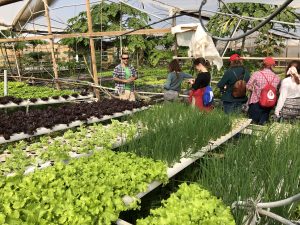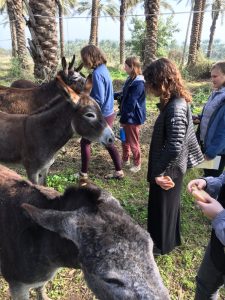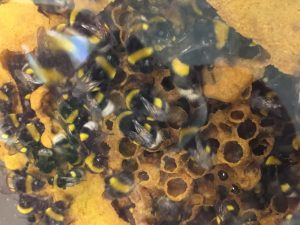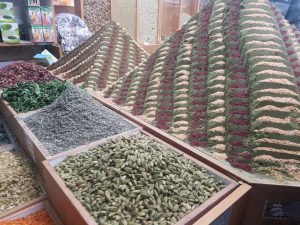
farm walk at Kibbutz Harduf

Chicken therapy at Harduf
This morning we bid farewell to the eco-conscious community of Adama and our newly installed Home BioGas digester near Klil and headed slightly eastward to the anthroposophical community of Kibbutz Harduf. This kibbutz was discussed a little during the fall semester, standing out as a successful Israeli organic and biodynamic vegetable production farm. Established in the early 80’s Kibbutz Harduf was established by twelve kibbutzniks committed to the teachings of Rudolf Steiner, an Austrian spiritual leader that wrote a series of lectures that became the foundation of biodynamic agriculture in the early 1900’s. In addition to pioneering a farming system that is used today across the globe, Steiner is also recognized as the person who conceived the educational philosophy that is known as Waldorf schools, anthroposophic medicine known by many as homeopathy and much more.
Our Kibbutz Harduf guide joined the kibbutz in the mid-1980’s, at which time the kibbutz was in the midst of developing a variety of agriculturally-based industries and community projects. Still thriving is the kibbutz’s Camphill Community which is a program focused on creating space and purpose for adults with disabilities. These individuals are part of the greater kibbutz mission, assisting with farm-based projects and overall maintenance of the community operations. In addition to the Camphill Community, Kibbutz Harduf has developed and implemented additional social services that fully integrate adults struggling with mental illness, as well as a foster care program for Israeli children who have been taken from their homes. Fundamental to these programs is the intentional integration of individuals into the workings of the kibbutz, in addition to time for exploring and creating art – much of which is sold at one of the kibbutz’s stores.
As many may already know, one of the goals of an anthroposophic community and Waldorf education is to create space for creative play and learning. This is fundamental to the Waldorf education which emphasizes unstructured education until a child feels ready for structured learning. Also built into this form of education is the cultivation of a child’s imagination so that fixed notions of what something “should” or “should not” look like are minimized. As you might imagine, screen time is not encouraged. Instead, long sessions outdoors and group projects for students of all ages are integrated into school curricula.
The agricultural enterprises at Kibbutz Harduf have not benefitted as consistently as the social service projects. In fact, many of their agricultural initiatives has struggled overtime. Kibbutz Harduf managed a dairy for many years, milking cows and making value-added products like yogurt and cheeses. They also maintained a bakery for some time, selling loaves of fresh baked bread locally. These products, in addition to their productive vegetable fields helped to build consumer recognition of products labeled as “Harduf”. However, many of the kibbutz’s agricultural projects started to lose steam resulting in the closing of their bakery and sale of their dairy processing plant to a Chinese company called Novum. As a result, the product label “Harduf” no longer represents products coming from the kibbutz and, as members of the kibbutz painfully found out no longer belongs to them.
Today, the main agricultural enterprise overseen and operated by kibbutz members is a thriving organic vegetable farm that sells its produce through the kibbutz store. We had the opportunity to make lunch from crops harvested from the fields – yet another delicious meal! Not only did we make salads from beets and fresh greens, we also made our own pita bread from scratch and learned how to transform tahini into an amazing dipping sauce.
Our day concluded in Haifa with some down time for shopping and dinner. Tomorrow we get to explore this ancient city before hopping on a plane back to the USA.

















